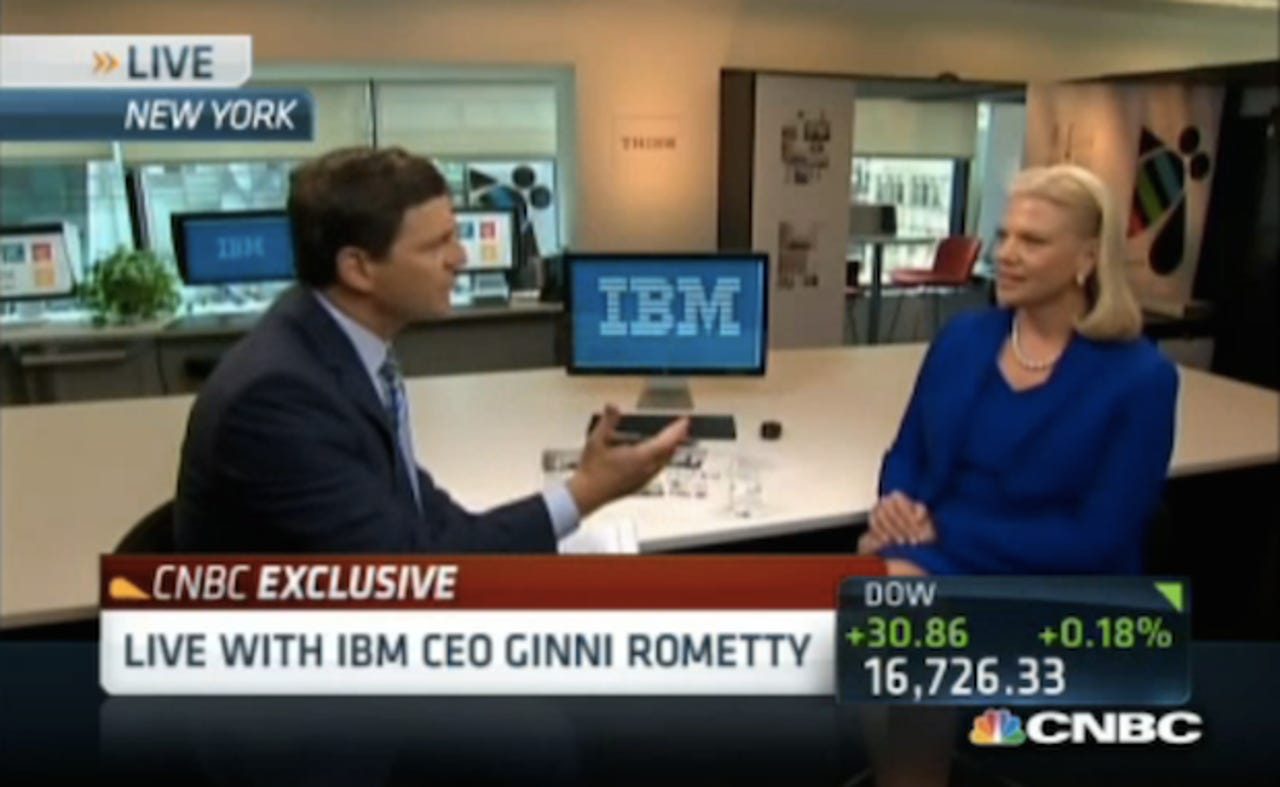Business
IBM's Rometty talks big data, emerging markets, and the software slump
IBM's chief executive said big data remains the company's biggest emerging unit, but has been helped along by more than 30 acquisitions over the last year.


Image: CNBC, video
IBM chief executive Ginni Rometty sat down with CNBC's David Faber ahead of the company's investors meeting on Wednesday.
Here are the snippets you need to know from the transcript:
- IBM has invested $30 billion dollars in the convergence between data and analytics. "Data is nothing unless you refine it," Rometty said. She also pointed to IBM's big data analytics business standing at $16 billion in worth, off about $100 billion in revenue — up by 9 percent year-over-year.
- Under Rometty, the company has made over 30 acquisitions in the last year, including Silverpop, Cloudant, The Now Factory, and Trusteer. In the past decade, that's more than 150 in total, she added later. It's part of the company's bid to expand and acqui-hire the best talent and technology in the cloud, data, and security fields, in a concerted effort to help enterprise customers crunch those data dumps.
- For IBM, the growth markets in the long-run are "absolutely the right investment," Rometty said. That means areas such as the Middle East and Africa and Latin America. IBM's BRIC (Brazil, Russia, India, and China) markets saw an 11 percent decline in revenue in the first quarter.
- Rometty noted that China, despite being a massive growth market, doesn't look like the rest of IBM's worldwide base. She said China represents less than 15 percent of the company's efforts, and is focused almost entirely on hardware. "[That] is not atypical for a market that's really developing, and as you put in big infrastructure to run banks, telcos... that's what our focus is." It's not to say IBM isn't looking at other areas to expand in the region, however. At its first-quarter earnings in April, hardware sales plunged by 23 percent.
- IBM's software sales business remains important, but it could do with a jumpstart. It may be a $29.1 billion chunk of the company, but grew just 1.4 percent in 2013 — in some cases slower than its key competitors.
- On Africa as a market to work in, Rometty said IBM had been in the region since the 1930s, and expanded its research presense significantly in 2012. But political instability across the 54 countries makes life tricky. "You're going to see Africa as the next frontier," she said, particularly in the next decade. "If you take the middle class, it's bigger than India's already."
- Where are the massive acquisitions? IBM has systematically snapped up a few couple-of-billion dollar businesses, but nothing particularly grandiose — or that expensive in the grand scheme of things. "We are very much a serial acquirer," Rometty said. Does that mean the innovation is dead? Not so, she added. IBM invests more than it spends on acquisitions, she noted.
- IBM spent $133 billion on research and development in the last decade. And that's likely not going to change any time soon. Rometty said: "We have not cut it back. I mean, my predecessors, myself, everybody has maintained because we're at your heart, an innovation company, you don't cut it back." Despite spending $13.9 billion on stock repurchases in 2013, the chief executive said if the company needed to invest more, it would.
- On Watson, another $1 billion is being invested in research into the intelligent platform. The company is opening up a lab in New York City in the near future, employing a couple of thousand people. "Watson is the foundation for this next era because all this big data, you need systems that learn that you don't have to program," she said, noting that there was "no doubt" that Watson will transform industries.